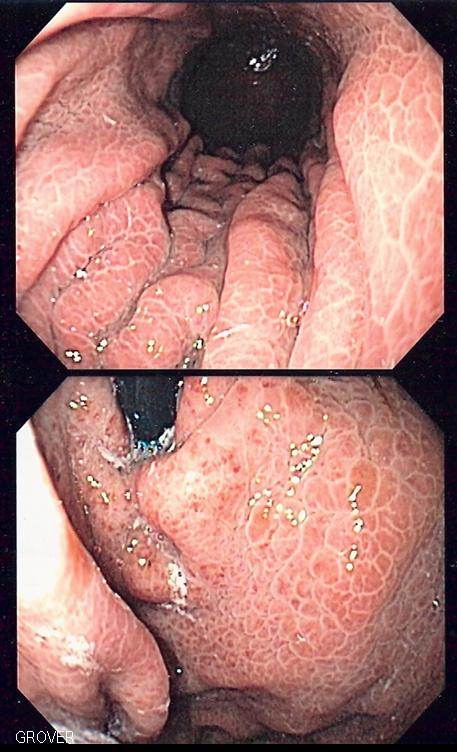Portal hypertensive gastropathy
Editor-In-Chief: Prab R Tumpati, MD
Obesity, Sleep & Internal medicine
Founder, WikiMD Wellnesspedia &
W8MD medical weight loss NYC and sleep center NYC
| Portal hypertensive gastropathy | |
|---|---|

| |
| Synonyms | N/A |
| Pronounce | N/A |
| Specialty | N/A |
| Symptoms | Gastrointestinal bleeding, anemia |
| Complications | Chronic blood loss, iron deficiency anemia |
| Onset | Often associated with portal hypertension |
| Duration | Chronic |
| Types | N/A |
| Causes | Portal hypertension |
| Risks | Cirrhosis, liver disease |
| Diagnosis | Endoscopy |
| Differential diagnosis | Gastric antral vascular ectasia, peptic ulcer disease |
| Prevention | N/A |
| Treatment | Beta blockers, endoscopic therapy |
| Medication | Non-selective beta blockers |
| Prognosis | N/A |
| Frequency | Common in patients with cirrhosis |
| Deaths | N/A |
Portal hypertensive gastropathy is a medical condition characterized by changes in the mucosa of the stomach due to portal hypertension. It is often associated with cirrhosis of the liver and is a common cause of gastrointestinal bleeding.
Etiology[edit | edit source]
The exact cause of portal hypertensive gastropathy is not fully understood. However, it is believed to be related to increased pressure in the portal vein system, which is often caused by cirrhosis of the liver. Other potential causes include congestive heart failure, hepatic vein thrombosis, and schistosomiasis.
Pathophysiology[edit | edit source]
Portal hypertensive gastropathy is characterized by changes in the mucosa of the stomach. These changes include erythema, edema, and friability, as well as the presence of vascular ectasia and spider angiomata. The increased pressure in the portal vein system leads to dilation of the submucosal veins, which in turn leads to the characteristic changes in the mucosa.
Clinical Presentation[edit | edit source]
Patients with portal hypertensive gastropathy may present with a variety of symptoms, including anemia due to chronic gastrointestinal bleeding, melena, hematemesis, and epigastric pain. However, many patients are asymptomatic and the condition is often discovered incidentally during endoscopy.
Diagnosis[edit | edit source]
The diagnosis of portal hypertensive gastropathy is typically made via endoscopy, which allows for direct visualization of the characteristic changes in the mucosa. Other diagnostic tests may include laboratory tests to assess for anemia and liver function, as well as imaging studies to evaluate for cirrhosis and portal hypertension.
Treatment[edit | edit source]
The treatment of portal hypertensive gastropathy primarily involves managing the underlying cause of the portal hypertension. This may include treating the cirrhosis or congestive heart failure, or managing the hepatic vein thrombosis or schistosomiasis. In addition, patients may be treated with medications to reduce the pressure in the portal vein system and to manage the gastrointestinal bleeding.
Search WikiMD
Ad.Tired of being Overweight? Try W8MD's physician weight loss program.
Semaglutide (Ozempic / Wegovy and Tirzepatide (Mounjaro / Zepbound) available.
Advertise on WikiMD
|
WikiMD's Wellness Encyclopedia |
| Let Food Be Thy Medicine Medicine Thy Food - Hippocrates |
Translate this page: - East Asian
中文,
日本,
한국어,
South Asian
हिन्दी,
தமிழ்,
తెలుగు,
Urdu,
ಕನ್ನಡ,
Southeast Asian
Indonesian,
Vietnamese,
Thai,
မြန်မာဘာသာ,
বাংলা
European
español,
Deutsch,
français,
Greek,
português do Brasil,
polski,
română,
русский,
Nederlands,
norsk,
svenska,
suomi,
Italian
Middle Eastern & African
عربى,
Turkish,
Persian,
Hebrew,
Afrikaans,
isiZulu,
Kiswahili,
Other
Bulgarian,
Hungarian,
Czech,
Swedish,
മലയാളം,
मराठी,
ਪੰਜਾਬੀ,
ગુજરાતી,
Portuguese,
Ukrainian
Medical Disclaimer: WikiMD is not a substitute for professional medical advice. The information on WikiMD is provided as an information resource only, may be incorrect, outdated or misleading, and is not to be used or relied on for any diagnostic or treatment purposes. Please consult your health care provider before making any healthcare decisions or for guidance about a specific medical condition. WikiMD expressly disclaims responsibility, and shall have no liability, for any damages, loss, injury, or liability whatsoever suffered as a result of your reliance on the information contained in this site. By visiting this site you agree to the foregoing terms and conditions, which may from time to time be changed or supplemented by WikiMD. If you do not agree to the foregoing terms and conditions, you should not enter or use this site. See full disclaimer.
Credits:Most images are courtesy of Wikimedia commons, and templates, categories Wikipedia, licensed under CC BY SA or similar.
Contributors: Prab R. Tumpati, MD


